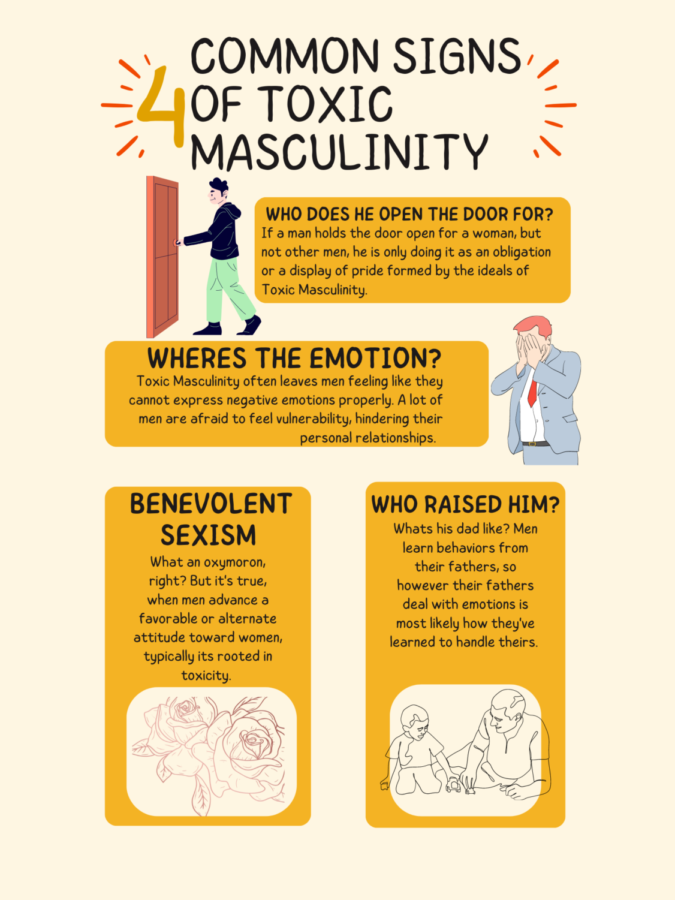The Timelessness of Toxicity
“Boys don’t cry,” “be a real man,” and “man up,” are all phrases boys have heard and will continue to hear for the rest of their lives. In times of extreme grief, panic, anguish, and distress, men are continuously told to toughen up or to simply just get over it. This is what toxic masculinity is. The effects it has on men are tenfold and they ultimately affect the rest of society as well.
Elizabeth Plank, a Canadian journalist and author traveled far and wide interviewing men from multiple different cultures, backgrounds, and status’. Her first novel, “For the Love of Men”, details toxic masculinity and the harm in it.
As early as the introduction, Liz claims that “We live in a culture that teaches boys stoicism over authenticity, dominance over empathy, and….that someone will…take their ‘man-card’ away.”
Later on in the paragraph she says that “boys learn that ‘it is better to be feared than to be loved.’” Similarly, senior Hailey Bennett who would recommend Plank’s book to anyone, believes that it’s not really a surprise men act the way they do, when it is what they’re taught.
“What’s really harmful is when we teach boys that being ‘tough’ means being angry and violent and then act surprised when they turn into men who are angry and violent,’’ Bennett said.
Liz Plank also says that Jordan Peterson, a Canadian masculinity influencer and journalist teaches his young male fans that “Instead of persuading men to have compassion for themselves and others more, he is instructing them to lean into rugged individualism, fear and rigidity. Instead of embracing vulnerability, he instructs men to run away from it.”
Junior Max Krebs, admitted that vulnerability is something he struggles with.
“I don’t really feel comfortable getting angry in front of people or crying in front of people. Those reactions are the ones I’ve struggled with the most.” This feeling is common in men.
Toxic masculinity is taught. Father’s are ultimately one of the most influential people in boys and men’s lives. Men who had this prominent figure in their lives had someone to turn to about the important things in life. They had a role model in handling emotions, and however their fathers and their fathers before them handled their emotions is directly related to how the young men learn to handle their own.
“Life lessons my father taught me? He taught me to be a gentleman, to open the door, and to make sure your woman is always taken care of and stuff like that. He taught me just to be respectful to women and treat them the best you possibly can and things like that,” Krebs says.
While these are good, respectful and gentlemanly things to do, they are ultimately deep rooted in toxic masculinity.
Plank says when navigating the fine line between chivalry and toxic masculinity, there is one simple rule: “if you wouldn’t do it for a man, don’t do it for a woman. Modern chivalry is not about what you do; it’s about why you do it.” and “Intention informs actions and the belief that underlies even a perceived ‘good’ action can in fact perpetuate harmful stereotypes that make all genders worse off.”
This is called benevolent sexism. It can be described as advancing a favorable attitude toward women. For example, when a man orders for a woman from a restaurant or walks on the side near the street, it is really deeply rooted in a way that proves to men that they are the providers and protectors.
In total, toxic masculinity is the product of the fragility of the male ego. When men feel threatened, challenged, or insecure, they feel the need to fall back into the very attitude that ends up harming them in the long run.
Your donation will support the student journalists of Francis Howell Central High School. Your contribution will allow us to purchase equipment and cover our annual website hosting costs. FHCToday.com and our subsequent publications are dedicated to the students by the students. We hope you consider donating to allow us to continue our mission of a connected and well-informed student body.







Sorrianthum • Dec 5, 2024 at 9:10 pm
So… Never do anything nice for anyone, never seek to improve yourself, and act entirely insularly and without regard for anyone else?
Wow, what a Utopian world we’d live in if “Toxic Masculinity” were defeated.
km • Aug 26, 2024 at 11:24 am
Standard feminist bigotry.